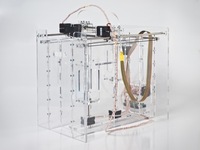 While the first open source personal 3D printers were plastic extrusion-based and recently we’ve seen several resin-based open source 3D printers emerge, we now see yet another 3D printing process appear in open source form: powder-based 3D printing.
While the first open source personal 3D printers were plastic extrusion-based and recently we’ve seen several resin-based open source 3D printers emerge, we now see yet another 3D printing process appear in open source form: powder-based 3D printing. The open source Pwdr project includes design for hardware and software to build and operate a 3D printer that uses a variety of fine powders as its print material. A bed of powder is gradually fused, layer by layer by depositing a liquid binder from a movable HP C6602A inkjet cartridge that has been co-opted for this process.
This is quite promising because powder-based printing has a couple of key advantages:
- No support material required; support is provided inherently by the powder-filled print bed
- A wide variety of materials, including glass, plastics, ceramics, etc. can theoretically be used in this type of machine
The Pwdr Model 0.1 machine has a build envelope of 125x125x125mm, a horizontal resolution of 96dpi (0.26mm) and a vertical resolution of 0.05mm. These specifications should lead to some very impressive 3D prints.
At this point the project seems to have just started and there is limited documentation and experimentation, but this will obviously clear up as more people get involved.
We have a couple of questions, however. First, the Pwdr documentation indicates use of the SLS process. We didn’t see evidence of a Laser involved, but presumably one could be added to the machine later.
Secondly, we’re wondering about the legalities of this device. The major 3D printing processes are (or were recently) under patent by the “big guys”. Did anyone on the project check this out?
Via GitHub and Thingiverse


According to Adrian Bowyer this Zcorp patented method of 3d printing (binder deposition) will expire in April 2013.. until then i can only guess no one can sell kits or commercially manufacture such 3d printer.
http://blog.reprap.org/2012/07/variations-on-powder-printing.html
According to Adrian Bowyer this Zcorp patented method of 3d printing (binder deposition) will expire in April 2013.. until then i can only guess no one can sell kits or commercially manufacture such 3d printer.
http://blog.reprap.org/2012/07/variations-on-powder-printing.html